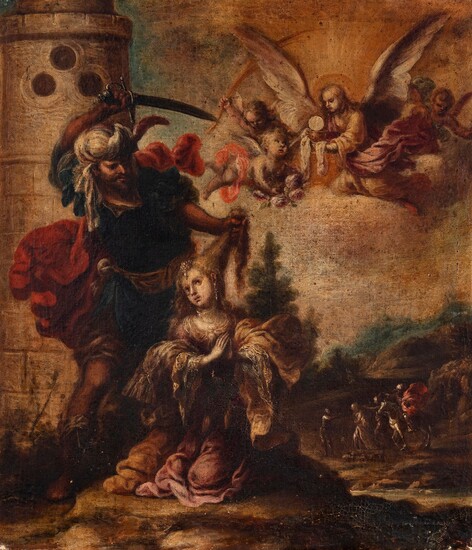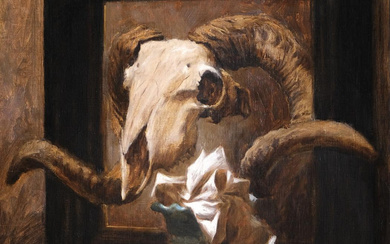Sevillian school of the second half of the seventeenth century. Workshop of JUAN DE VALDÉS...
Sevillian school of the second half of the seventeenth century. Workshop of JUAN DE VALDÉS LEAL (Seville, 1622 - 1690) "Martyrdom of Saint Barbara". Oil on canvas. Relined. Spanish frame of the XVIII century.
Sevillian school of the second half of the seventeenth century. Workshop of JUAN DE VALDÉS LEAL (Seville, 1622 - 1690)
"Martyrdom of Saint Barbara".
Oil on canvas. Relined. Spanish frame of the XVIII century.
Size: 54 x 48 cm; 60 x 53,5 cm (frame).
The martyrdom of Saint Barbara was the same as that of Saint Vincent: she was tied to a rack, scourged, torn with iron rakes, placed on a bed of sharp pieces of pottery and burned with red-hot irons. Finally, King Dióscoro sent her to the court, where the judge pronounced capital punishment by beheading. Thus, we see in the canvas the moments prior to the decapitation of the saint with allegorical allusions to the Eucharist. Due to its characteristics, we can relate this work to the workshop of Juan de Valdés Leal.
In spite of the difficult character with which he appears portrayed in the sources, the truth is that the work of Valdés Leal is quite varied and is in line with the painting that was done in his environment. We do not know at what date he moved to Cordoba, although it is likely that he had already received his first artistic training in his native city. It has been speculated that he was close to the workshop of Herrera el Viejo, and also to the art of the Cordovan Antonio del Castillo, as possible influences for his first known signed and dated work, the San Andrés de la iglesia de San Francisco de Córdoba, from 1647. In it he combined with visible success the monumentality of the figure of the saint with a naturalistic approach. In 1656 he settled in Seville, where he spent most of his life. In 1660 he was one of the founders of the Academy of Drawing, of which he became president in 1663. The following year Palomino established his trip to the court and to El Escorial, a journey that can still be understood as an apprenticeship, driven by his eagerness to know the works of the great masters present in the royal collections. In 1667 he joined the Brotherhood of Charity of Seville, whose founder had been Miguel de Mañara, the noble visionary author of the eschatological Discourse of Truth, to which Valdés would remain attached from then on. In 1671, Valdés Leal had the opportunity to work as an architect on the ephemeral decorations that the cathedral of Seville had installed to celebrate the canonization of Saint Ferdinand. Thanks to these works Palomino defines him as "a great draftsman, perspective and architect". He also made two engravings, reproducing his works in the cathedral, for Fernando Torres Farfán's book celebrating this event, which gives us an insight into his work as an architect. These are his most important works as a printmaker, although his engraving of the cathedral monstrance, a self-portrait and the posthumous image of Miguel de Mañara are also known. In 1672 he was in Cordoba, an occasion that Palomino took advantage of to meet him personally. This gives more value to the affirmation of the Cordovan treatise writer on the literary interest of Valdés Leal, since he makes him possessor of "the ornament of all the good letters, without forgetting those of poetry". Shortly before his death he suffered an illness that prevented him from continuing to work, forcing him to leave the commissions he kept in the hands of his son, a painter in his workshop.
View it on
Estimate
Time, Location
Auction House
Sevillian school of the second half of the seventeenth century. Workshop of JUAN DE VALDÉS LEAL (Seville, 1622 - 1690) "Martyrdom of Saint Barbara". Oil on canvas. Relined. Spanish frame of the XVIII century.
Sevillian school of the second half of the seventeenth century. Workshop of JUAN DE VALDÉS LEAL (Seville, 1622 - 1690)
"Martyrdom of Saint Barbara".
Oil on canvas. Relined. Spanish frame of the XVIII century.
Size: 54 x 48 cm; 60 x 53,5 cm (frame).
The martyrdom of Saint Barbara was the same as that of Saint Vincent: she was tied to a rack, scourged, torn with iron rakes, placed on a bed of sharp pieces of pottery and burned with red-hot irons. Finally, King Dióscoro sent her to the court, where the judge pronounced capital punishment by beheading. Thus, we see in the canvas the moments prior to the decapitation of the saint with allegorical allusions to the Eucharist. Due to its characteristics, we can relate this work to the workshop of Juan de Valdés Leal.
In spite of the difficult character with which he appears portrayed in the sources, the truth is that the work of Valdés Leal is quite varied and is in line with the painting that was done in his environment. We do not know at what date he moved to Cordoba, although it is likely that he had already received his first artistic training in his native city. It has been speculated that he was close to the workshop of Herrera el Viejo, and also to the art of the Cordovan Antonio del Castillo, as possible influences for his first known signed and dated work, the San Andrés de la iglesia de San Francisco de Córdoba, from 1647. In it he combined with visible success the monumentality of the figure of the saint with a naturalistic approach. In 1656 he settled in Seville, where he spent most of his life. In 1660 he was one of the founders of the Academy of Drawing, of which he became president in 1663. The following year Palomino established his trip to the court and to El Escorial, a journey that can still be understood as an apprenticeship, driven by his eagerness to know the works of the great masters present in the royal collections. In 1667 he joined the Brotherhood of Charity of Seville, whose founder had been Miguel de Mañara, the noble visionary author of the eschatological Discourse of Truth, to which Valdés would remain attached from then on. In 1671, Valdés Leal had the opportunity to work as an architect on the ephemeral decorations that the cathedral of Seville had installed to celebrate the canonization of Saint Ferdinand. Thanks to these works Palomino defines him as "a great draftsman, perspective and architect". He also made two engravings, reproducing his works in the cathedral, for Fernando Torres Farfán's book celebrating this event, which gives us an insight into his work as an architect. These are his most important works as a printmaker, although his engraving of the cathedral monstrance, a self-portrait and the posthumous image of Miguel de Mañara are also known. In 1672 he was in Cordoba, an occasion that Palomino took advantage of to meet him personally. This gives more value to the affirmation of the Cordovan treatise writer on the literary interest of Valdés Leal, since he makes him possessor of "the ornament of all the good letters, without forgetting those of poetry". Shortly before his death he suffered an illness that prevented him from continuing to work, forcing him to leave the commissions he kept in the hands of his son, a painter in his workshop.





